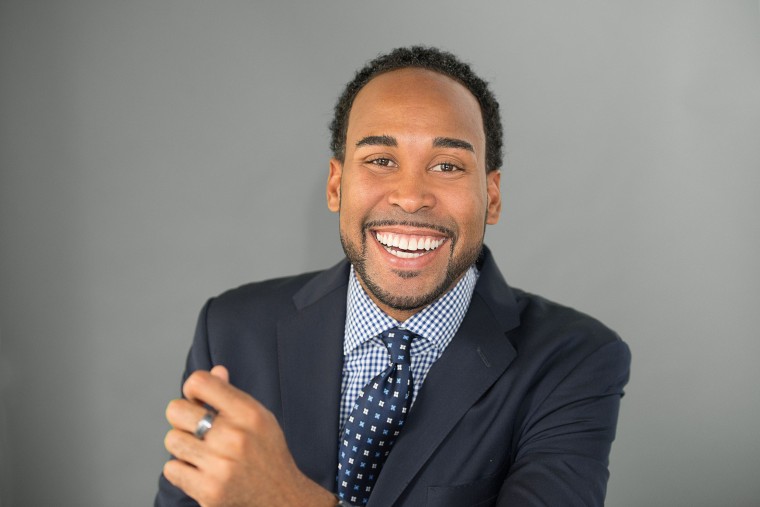New Lavender Book app will map safe spaces for Black queer people
Black LGBTQ people face an increased risk of violence and harassment. A new app hopes to help change that.
David Johns, executive director of the National Black Justice Coalition, said Black queer and trans people have to worry about things “most people take for granted and don’t have to think about, like whether or not a barber or beautician is going to say something that might be homophobic, or you’re going to be denied access to a cake because a baker is going to hide their hate behind religion,” he said.
Knowing this, Johns said he has dreamed for years about creating a way for Black LGBTQ and same-gender-loving people to more easily find safe spaces.
That dream became Lavender Book, a web-based app launched Monday and created in collaboration with Out in Tech, a nonprofit for LGBTQ people who work in the technology sector.
Lavender Book’s key feature is a crowdsourced search engine that shows users safe and friendly establishments in different locations. Users can narrow down their search by the service they’re looking for and a list of attributes, such as gender-neutral restrooms, Black- or trans-owned, or LGBTQ-trained staff.
The app is based on the historic Green Book, which was a guide for Black road-trippers published during the Jim Crow era that mapped safe spaces for Black people.

“We know how much uncompensated labor goes into finding safe spaces,” Johns said. “Black LGBTQIA+ folk, and then [Black, Indigenous, and people of color] folks with intersectional identities thereafter, spent a lot of time making phone calls and leveraging community networks to identify places where the likelihood of us being victims of verbal harassment, bias, discrimination or violence associated with actual or assumed sexual identity and gender orientation or expression will happen.”
Some of that, Johns said, is informed by the disproportionate rates of violence against Black LGBTQ people. The National Coalition of Anti-Violence Programs, a nonprofit dedicated to reducing violence against LGBTQ people, found in 2013 that people of color comprised the majority — 58 percent — of LGBTQ and HIV-affected people who reported hate violence to its member programs.
The report also found that Black LGBTQ and HIV-affected people were 1.4 times more likely to experience physical violence and two times more likely to experience threats and intimidation during incidents of hate violence.
Johns said the violence Black LGBTQ people face is nothing new. In the month of April alone, the National Black Justice Coalition reported on the deaths of at least seven trans women — all of them women of color, five of them Black. So far in May, three more trans women have been killed, all of them also women of color.
Since the start of 2021, at least 24 trans and gender nonconforming people have been killed, according to the Human Rights Campaign, putting the year on track to outpace the number of deaths in 2020, which HRC called “the most violent year on record” since the group began tracking anti-trans violence in 2013.
“For so many of us, the spaces we’re forced to move through and the world around us is not welcoming,” Johns said.
One of the beta-testers for the app and a member of NBJC’s Youth and Young Adult Action Council, Sage Grace Dolan-Sandrino, 20, said that as a Black and Latina queer and trans woman, “it is imperative to my survival that I know in what spaces I am safe.”
“Growing up in Washington, D.C., I became familiar with my safe spaces — where to eat, where to shop, and where NOT to,” she said. “Since moving to upstate New York for college, it has become incredibly aware to me that so many of the spaces are not safe. With the introduction of an app and program like this, I may have been able to avoid getting my car fixed by a Trump-supporting, white nationalist, gun-toting mechanic.”
She said that while using the app, she could “easily imagine the profound impact this could have on the safety of being queer in public.”
Peter Redmond, Out in Tech’s New York City chapter head and events producer, said the app is “for us, by us,” because it was built by a diverse team of engineers, product designers and UX designers.
He said he hopes the app grows to include not just businesses like restaurants, but also essential services like health care.
“I have found myself traveling to cities where I’m not exactly sure will I be welcomed in certain establishments, so I’ve definitely had to lean on services like this in the past,” he said. “So to have the Lavender Book now join all of these other services out there, I think it’s only going to just create a better experience for anybody that’s looking for services where they know they won’t be discriminated against.”